Bill Keefe
Age: 65
If you’re an older runner and you’re not sure you can improve, let us show you how we helped Bill turn his 5k pace into his half marathon pace and beat his blood pressure issues
Colleen Balling
Age: 59
Many runners think you have to start young. Let us show you how we helped Colleen - who didn’t start running until her late 50’s - run her first marathon and BQ
Melanie Triscott
Age: 40
If your performances are sliding and you’re not sure how to get back on track,let us show you how we helped Melanie beat her 3:18 PR from 2004 (when she was 26) at age 40
Laurie Householder
Age 45
If you’re like Laurie (you have a big family, a demanding job, and other obligations)learn how we helped her beat decision fatigue and smash all of her goals (so you can too).
Bob Muehring
Age 57
If you're struggling with injuries and your body isn't quite working like it used to, learn how we helped Bob through injuries and poor performances to 3 PR's in one year.
Chris Carey
Age 49
Learn how we helped Chris rebound from a disastrous first marathon and crush his next race - all by actually training slower (and smarter)
Still Not Convinced?
Here's more runner's we've helped more runners like you
Beginner Runners
-
Joy Duling - Training To Lose Weight, Get Healthier, and Run Her First Race
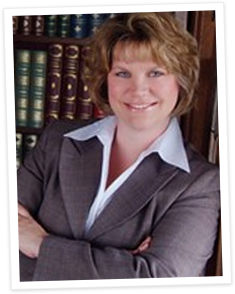
The Runner:
- Name: Joy Duling
- Age: 37
- Hometown: Peoria, IL
Previous PR's
Joy started working with the RunnersConnect team a little over a year ago. When she joined the team she was struggling with a variety of health issues, including:
- Being 55 pounds overweight
- 3 different medications for her health
- Had blood pressure and cholesterol numbers through the roof
- Had never finished a race - and really wasn't even running at this point
Joy knew she needed to make a change in her health, so she signed up for a local half marathon just hoping to walk it.
But, as the race date kept getting closer, she was increasingly nervous about her ability to finish and was becoming frustrated with a lack of results.
Joy's Problems:
- Joy started by simply walking (and covering a good amount of distance per day - 60 minutes or more) but was losing motivation quickly due to lack of progress. The problem was that while walking started out feeling like a good achievement, it quickly wasn't giving her the physical rush that she wanted to see after investing so much time. She wanted to push herself more to get back that sense of accomplishment.
- Likewise, Joy wasn't seeing the improvements in her overall health that would keep her motivated. She was losing some weight, but not as much as she liked, and she still felt like she relied too heavily on medications to keep her healthy.
- Joy was also starting to get cold feet about being able to actually walk the half marathon I signed up for, which was causing a lot of anxiety and trying to find ways not to do the race or get in her daily training.
How RunnersConnect Helped Her:
- The first step we took with Joy was building her a very gradual run-walk plan that slowly transitioned her into running full-time. Joy started with 9 minutes walking and 1 minute running. Each week we worked to increase the ratio of running to walking.
- We kept the focus of the training on a 3-4 week blocks and periodically reviewed her progress for motivation.
- Joy had countless bad days and tough weeks like every runner (even experienced runners) do. I tried to go back and count exactly how many and when they occurred, but over the past year there have been too many examples.
The progression was slow enough that Joy never felt like she was taking too big of a jump. More importantly, because the plan was structured to her current fitness level each week was a challenging, yet comfortable step forward.
"By having a structured plan in place, it helped me avoid the temptation to do too much, too soon. I also felt a lot more confident. Previously, I would visit running message boards and solicit advice from other runners, but everyone had a different take on what I should be doing and I lost motivation seeing the rapid progress some runners seemed to be making. But, with a plan in place, it was a huge weight off my shoulders."
By keeping the focus on the training for that week, it prevented Joy from getting overwhelmed and believing the training plan was too daunting.
Also, each month we conducted a review by looking at her logs on our training platform. This helped her see how far she had come during that time. It can be easy to lose sight of how much progress you've made.
We helped Joy battle through the inevitable rough patches by teaching her the secret of the "reset button". She stayed very consistent and bounced back quickly from every training interruption that occurred.
Joy's Results:
- Lost 55 pounds
- Blood pressure and cholesterol numbers back under control - without medication
- Finished her first HM - running
Through our time working with her, Joy lost 55 pounds and is getting fitter every week. I will be the first to admit that Joy's weight loss isn't all directly related to running. Weight loss also requires hard work and dedication nutritionally.
However, I think the consistency running added to Joy's daily routine helped her stay more disciplined when it came to nutrition and prevented the peaks and valleys that often accompany weight loss.
Joy was able to wean herself, under a doctor's orders, off all her medications. Her blood pressure and cholesterol numbers were now in check naturally.
Not only does this improve Joy's quality of life and overall health, but I noticed it also had a dramatic impact on what she believed possible. Rather than accepting the status quo, Joy's outlook and self-belief is overwhelmingly positive.
Finally, Joy was able to finish her first HM - running almost the entire way. Even better, she's excited about tackling the next one, improving her time, and even training for a marathon next! You can hear what Joy was able to accomplish, in her own words, in this great video she sent us.
-
Dean Roberts - From Often-injured Beginner to Healthy, Racing Veteran
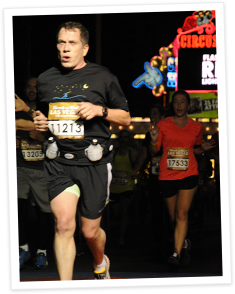
The Runner:
- Name: Dean Roberts
- Age:
- Hometown:
Previous PR's
52:33 10K
Goal of 1:57 in the HM (Based off 10K time)
Goals
On March 28th I had no personal bests. I had come to running for the 1st time from a physiotherapist treatment regime including a "Return to Run" program to address severe calf spasm issues that have always prevented me from running in the past.
After completing the "Return to Run" program, running 5K non-stop I quickly realized I needed another plan to prevent me from doing to much, to soon and re-injuring myself.
So my primary goal on March 28th was to continue running without injury, and to run a Sub 55 10K at the Ottawa Night Race on July 13, 2013.
Dean's Problems:
- Dean had been struggling with a calf injury that basically prevented him from running at all. He had success when using a very safe "return to running" plan but the injury reoccurred whenever he tried to increase his mileage or intensity.
- Was doing all his workouts and runs in the dreaded "grey zone". Too fast to properly recover (the reason for his injuries) but too slow to work on the right physiological systems.
- Left to his own devices, Dean was always trying to squeeze in more speed workouts. He believed the extra intensity would help him improve his times, but he was lacking the aerobic conditioning to properly race longer distances like the 10k and half marathon.
How RunnersConnect Helped Him:
- First, we reduced the number of harder speed workouts in Dean's schedule and replaced them with aerobic building easy mileage. This allowed Dean to build his aerobic strength, run more overall miles, and run higher quality speed sessions when he did have them in his schedule.
- We gave Dean explicit pacing instructions, even on his easy days, to ensure that he was always training at the right intensities to prevent injuries and target the right training zones.
- Dean initially resisted the slow pace of his easy runs, constant reminders about the science and the long-term planning kept Dean honest and on track.
- We spread out Dean's workouts and long runs, and added strength workouts to improve calf strength, to allow for greater recovery time and eliminate the calf issues he experienced.
Dean's Results:
- 22:30 5K (equivalent to a 46:55 10k, which would be a 5:30 improvement)
- Dean ran his first half marathon in 1:52:07. Even better, he felt strong the entire race and he wasn't dying for days afterwards.
"This smashed even my stretch goal and I couldn't be happier. In all my races so far I've been simply amazed at what a great feeling it is being well trained and well prepared for the task at hand."
"It's eminently possible to just show up and do the distance. Lots of people do just that, some of those people even do it and finish faster than I do. But for me, being well trained means the suffering only lasts about the last quarter of the race and for a few minutes after crossing the finish line. An hour after my HM I was sitting down for a steak dinner with my buddies. The day after I was hiking through the desert with nothing but euphoria and legs feeling great."
Fears Before Starting
The initial training plan that was generated for me had me a little worried about the work out days. I think my first work out was a hill routine and I was fretting about inclines and the like. But I received an unprompted introductory email from Jeff within the hour, he made some adjustments and I felt pretty confident heading into my first week of training
One of my favorite parts of RunnersConnect is to not have to worry about constructing and maintaining my own training schedule. I really enjoy all the articles and blog posts about what makes a good schedule, why things are done the way they are since they give me the confidence that training being proposed is valid.
But at the end of the day (usually a busy work day) it is absolutely awesome to just pick some goal races, answer a few questions and have the RunnersConnect tell me how to get there.
But there are lots of places to get customized training plans. Being able to connect with the coaches and other runners to ask questions about the training is unique, and invaluable.
-
Paige Poray - First Time Runner Finishes 5K in Just 2 Months
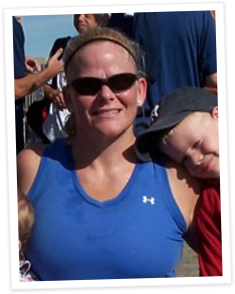
The Runner:
- Name: Paige Poray
- Age: 37
- Hometown: Washington, DC
Previous PR's
Has never run before
Goals
Wants to finish a 5K and become healthier in general
Paige's Problems:
- Has never run before and has no idea where to start. The idea of finishing a race in the next 2 months is a scary and daunting task.
- Seven months post pregnancy with her second child and still carrying the extra weight she desperately wants to get rid of.
- Has a hard time developing the confidence to run harder and finish longer runs that she knows she needs to do to be successful.
How RunnersConnect Helped Her:
- First, Paige started on one of our beginner plans that very slowly and incrementally increased her running distances while adding in walking breaks to help her exercise longer and take away the fear associated with long, extended runs.
- We talked to Paige about taking each training week one week at a time and not looking to the future. While we certainly had a long-term plan in mind, showing Paige what she would be running 4 or 6 weeks down the road would have been daunting and reinforced negative attitudes that she couldn't do it.
- Paige used our vast library of training articles and training clinics with detailed explanations and examples of the running workouts she was to complete. Furthermore, Paige checked in with the Live Coach Chat to ensure that her body was responding to the training as intended and participated in the forums to help her answer any questions she might have after completing a run.
- Our supportive community kept Paige motivated and moving towards her goals when minor interruptions from her family kept her from sticking with the schedule.
Paige's Results:
- After only two months working together, Paige finished her first 5k in 40 minutes while running the entire distance.
- More importantly, Paige has been bitten by the running bug. She has signed up for a 6 mile race just 5 weeks after her first 5k and plans to complete her first half marathon this January. We couldn't be more excited about Paige's complete change in perspective about running and her belief in what she can accomplish.
-
Kimberly Dewrell - First Time Marathon Finisher
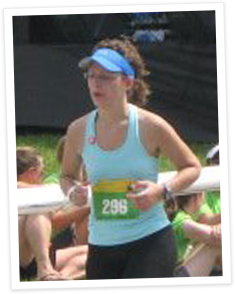
The Runner:
- Name: Kimberly Dewrell
- Age: 32
- Hometown: Baltimore, MD
Previous PR's
Half Marathon - 2:10:41
Marathon - Long-Time Goal To Finish
Kimberly's Problems:
- Kimberly had the long-time goal of finishing a marathon, but she did not know how to transition from the half marathon training she was currently doing and apply it to the marathon.
- Worried that her busy job as a teacher would affect her ability to get the training in, especially during the short, cold winter months.
- Because Kimberly had never trained for the marathon, she didn't know how to properly fuel herself on long runs or in races. Furthermore, Kimberly had trouble developing her sense of pace and finding her ideal marathon pace.
How RunnersConnect Helped Her:
- First, we provided Kimberly a plan that slowly progressed from her half marathon training, which consisted of roughly 20 miles per week and a 11 mile long run, to very marathon specific fitness. Each workout built incrementally on the previous week, which allowed Kimberly's body to easily adjust to the training, but also gave her the confidence that she could run the entire distance.
- Using our vast library of nutrition articles and training clinics, Kimberly worked diligently on strategies for eating and drinking before and during the race. Kimberly experimented with different types of nutrition products and fueling strategies that allowed her to easily and confidently eat during the run.
- With constant checking-in with her friends on RunnerConnect, Kimberly stayed motivated and continually adapted her workouts through one of the snowiest winters in Baltimore's history.
Kimberly's Results:
- Kimberly finished the Frederick Marathon in record heat that reached 88 degrees. Despite the oppressive weather, which forced almost a 1/4 of the field to quit, Kimberly successfully finished her first marathon!
Boston Qualifiers
-
Eric Nordquist - 25 minute PR to get under new Boston Qualifying standards
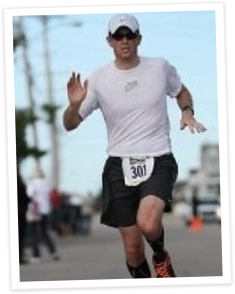
The Runner:
- Name: Eric Nordquist
- Age: 37
- Hometown: Connecticut
Previous PR's
Marathon: 3:30
Eric's Problems:
"I put in 18 weeks of training, using the advanced 1 program suggested by Hal Higdon. I had aspirations to go 3:15 and qualify for Boston based on my shorter distance times...I finished at 3:30. With the exception of a few weeks off the tracks - I followed Hal's program as he suggested, but still fell of pace very hard at mile 18. Now, Boston qualifying got even faster and I need to figure out a way to get the most out of myself"
- Lack of consistency
- Focusing on the wrong type of workouts
- Understanding the purpose of workouts
Eric struggled to stay consistent with his training thanks to a busy job and losing motivation when the goal was a long way away. His focus would peak 14-16 weeks out from the marathon but between those marathons his training was sporadic and resulted in him starting from scratch every marathon segment.
Eric followed the Hal Higdeon marathon plan, which follows a traditional old-school training structure: One VO2max or speed session early in the week, a tempo session the second half of the week, a fast run on Saturday and a long run on Sunday. As such, Eric was missing the both the concept of periodization and race-specific training.
Eric was still a relatively new runner and he didn't fully grasp the purpose of every session he was running, which lead to three issues: (1) he would sometimes run too fast (believing faster is better) and miss the mark on the purpose of the session; (2) when adjusting his schedule he didn't prioritize the workouts correctly; and (3) he wasn't fully confident in his plan and always felt like he needed to add more or run faster.
How RunnersConnect Helped Him:
- First, the coaching staff and the community of fellow runners helped keep Eric motivated and on track when the next marathon was months away. Having current Boston qualifiers and runners trying to qualify with him helped Eric stay accountable and provided that extra nudge when he didn't want to get out the door.
- We immediately began to work on the race-specific demands of the marathon in Eric's final 12 weeks of training. This included a heaping of aerobic threshold runs to get his body burning fat as a fuel source at marathon pace and implemented long runs with either fast finish or surge elements to increase fatigue resistance.
- Our coaching staff helped Eric prioritize his workouts and ensure that he didn't overtrain by trying to squeeze everything in when a late night at the office resulted in a missed run. His fellow teammates and coaches also helped him stick to the pace instructions on each workout by reminding him of the purpose of each session and sharing bad experiences to convince him when he wanted to run faster.
Eric's Results:
- 3:04:59 and a Boston qualifier! Eric will be running the 2015 Boston Marathon!!
-
Peter Tiscione - Needed to drop 4 minutes to qualify for Boston...PR'd by 10 minutes
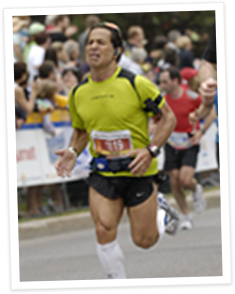
The Runner:
- Name: Peter Tiscione
- Age: 50
- Hometown: Montreal, Canada
Previous PR's
Marathon - 3:39 (qualifying standard was 3:35)
Half Marathon - 1:44
Peter's Problems:
- Peter was running his recovery runs too fast, which meant that he was not recovering properly and not rested enough for his scheduled hard sessions. This made it difficult to run faster workouts.
- The workouts Peter was doing were not marathon specific. He relied too heavily on slow long runs and shorter speed sessions. Neither of these workouts specifically targeted Peter's weaknesses or the specific marathon fitness he needed to develop.
- Peter has a busy and often hectic schedule. He not only owned his own business, which requires him to be on his feet most of the day, but he also teaches at a local University. It was important that his schedule factor these outside influences to be most effective.
- Peter lacked the confidence to attack his workouts and perform training runs that he was capable of doing. Often, he would talk himself out of a workout before it even began.
How RunnersConnect Helped Him:
- First, we worked very hard to slow Peter down on his easy runs. While this is never an easy task for any runner we work with, by giving him direct paces to follow and continually expounding on the benefits of slowing down, we were able to get the most out of each run and workout he did.
- Peter's workouts became much more marathon specific. Every mile he ran was specifically designed to elicit a certain physiological benefit. We implemented threshold intervals, long runs that increased fuel efficiency, and shorter speed elements that helped him improve his form and mechanics.
- By implementing a progressive schedule and using detailed race strategies, we were able to give Peter the confidence he needed to run the paces and times during workouts and races we knew he was capable of. Once he trusted that his assigned paces were doable, he gained the confidence to attack each race and workout.
Peter's Results:
- After only 5 months working together, Peter qualified for the 2011 Boston Marathon. His new personal best's are now:
- With the qualifying time a distant memory, Peter is excited about training for the Boston Marathon and making his race a memorable experience and another big PR.
Half Marathon - 1:36:46
Marathon - 3:28:40
-
Rich Heinzeman - Personalized workouts result in a 9-minute PR
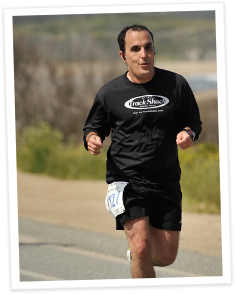
The Runner:
- Name: Rich Heinzeman
- Age: 38
- Hometown: Orlando, FL
Previous PR's
Marathon - 3:15
Rich's Problems:
- Needed personalized workouts
- Needed to develop the speed to run under 3:10
- Needed to increase volume and training paces gradually
Rich was following the training of another runner who was about his ability level and basically replicating their workouts. While this certainly helped get Rich 90% of the way towards his goal the lack of specificity to his strengths and weaknesses compared to his training partner prevented him from reaching that next level.
Specifically, Rich's weakness was that he didn't have the speed (lacked the efficiency and economy) to get under 3:10. He was coming off a long period of marathon training where he neglected improving his running economy and efficiency. While his aerobic system was where it needed to be, Rich needed to work in more speed development to improve his neuromuscular system.
Because Rich needed to take a big step up in his training to reach the qualifying mark, it was important he do it gradually. Rich's original plan was an all-or-nothing approach, Instead of listening to how his body was responding to training and increasing pace or volume only when it was ready, Rich was constantly pushing his easy run pace and long run volumes, which was leading to stagnant progress.
How RunnersConnect Helped Him:
- Our first step with Rich was starting him on a speed development segment. We assessed his previous race and workout times and knew he needed a 4-6 week speed development phase before he began working towards his spring marathon. This allowed Rich to improve his running economy and efficiency. (In layman's terms, this meant Rich could now run farther with less effort and while expending less energy, which conserves precious carbohydrates).
- Once Rich was 12 weeks out from his goal marathon (the Martian marathon in Michigan) we began focusing back on the long runs and aerobic threshold work. We gradually increased his mileage and total amount of volume he performed during workout sessions. The result is that we were able to perform 3 times as many marathon paced miles (up to 12% from 4% of weekly mileage) compared to his previous marathon training segments.
Rich's Results:
- Despite the Martian marathon needing to reroute the course due to flooding concerns and high winds, Rich was able to run 3:06:21 and qualify for Boston!
-
Richard Harris - From First Race Ever to Local Elite
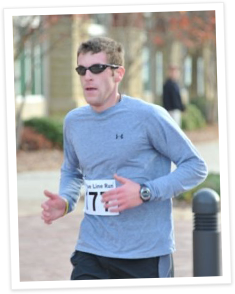
The Runner:
- Name: Richard Harris
- Age: 25
- Hometown: Charlotte, NC
Previous PR's
5k - 19:10
Half Marathon - 1:24:30
Richard's Problems:
- Richard had a very limited training background and had never trained in a somewhat structured running environment.
- Richard was piecing together workouts and information gathered from Runners World, books, and other sources with no long term planning concerning the development of his training.
- With limited racing experience, Richard didn't know how to race effectively and maximize his fitness on race day.
- Richard lacked the confidence and had a hard time motivating himself to do the harder workouts necessary to improve his race times.
How RunnersConnect Helped Him:
- First, with the help of Richard, we created a long-term plan to start targeting the goals Richard wanted to hit over the next few months and for the following year. We went back and analyzed the long term plan every few months to make sure we were still on target. For the most part, we were always ahead of target and adjusted his goals based on his increasing level of fitness.
- With a long term plan in hand, we detailed Richard's training schedule using three week blocks. This detailed plan assigned each run with a specific purpose, which was explained to Richard so he could see and understand the direction of his training.
- Richard and his coach worked extensively on practicing and developing the racing skills necessary to race to his best each time out. To do this, his coach assigned him specific workouts, such as cut down runs and hammers, each week that were designed to practice these skills.
- Our awesome community and the friends Richard made on the site help hold him accountable for his workouts and kept him motivated and confident that he was moving in the right direction.
Richard's Results:
- After less than a year working together, Richard's new PR's are:
- The process of developing his racing skills is a long and ongoing process, which took lot of practice and patience on Richard's part. However, he has improved his pacing skills considerable, which has allowed him to run a more tactically efficient race. The results of his practice are evident in his racing times.
- With the great success he's had over the last few months, Richard is excited to attack each workout on his schedule and now views the tough workouts as a challenge instead of something that he doesn't think he can do. As a coach, it is a phenomenal feeling to watch an athlete develop that type of confidence.
5k - 16:56 (a 2 minute and 14 second improvement) *Updated 8/5/10 - Richard PR'd at 16:40
Half Marathon - 1:20:50 (a 3 minute and 40 second improvement)
Masters Runners
-
Mike Bosch - New-to-running Masters runner becomes one of Canada's best
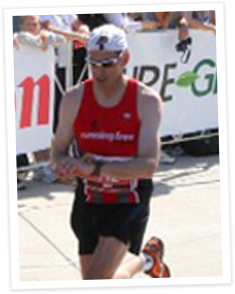
The Runner:
- Name: Mike Bosch
- Age:
- Hometown: Canada
Previous PR's
5km 17:54 chip
Half Marathon in 1:23:42
30k - 2:03:10
Marathon in 2:56
Mike's Problems:
- Mike was a relatively new runner, despite being very talented. He'd recently lost 85 lbs and as a result was improving rapidly. That meant his optimal training paces were constantly changing and he was having a difficult time running at the right effort levels and figuring out just of fast he needed to run his workouts.
- Likewise, because of the rapid improvements, Mike was constantly upping his training volumes and intensities, but was struggling to find the right balance that was going to allow him to train at the level he needed to go sub 3 hours, but also factor in his age and experience level. The result was inconsistent workouts and a nagging achilles injury.
- Mike wanted to include strength work in his training since he knew it was a critical component to staying healthy as a Masters runner but didn't know how to work it in with his mileage and workouts. He was either doing too much or not doing strength at all.
How RunnersConnect Helped Him:
- By analyzing Mike's workout data and constantly monitoring his races we were able to continually adjust Mike's training paces to account for his fitness level and rapid improvements. This meant Mike was always training in the right physiological zones and maximizing his workouts and kilometres run.
- We helped Mike avoid overtraining by making sure his volumes and the amount of speed workouts in his training didn't go overboard. Like any runner, Mike always wanted to do more, but the reassurances from his coaches and the shared-lessons from his teammates helped him stay on track and not do more than the schedule instructed.
- Mike's training schedule had cross training and strength training built-in for his experience level, training volumes and age. He was assigned specific, measured strength routines on appropriate days as part of his training (not just as an add-on). This allowed Mike to increase his core strength and get rid of his nagging achilles issue.
Mike's Results:
- 5km 17:18
- 30kin 1:55:51
- Half Marathon in 1:20:48
- Marathon in 2:48:30
-
Kara Schmidt - Experienced Masters runner rekindles her passion for training and racing
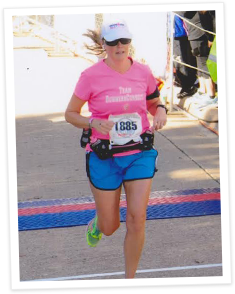
The Runner:
- Name: Kara Schmidt
- Age:
- Hometown: Texas
Previous PR's
Half Marathon: 2:08
5k - 27:02
Background
I had thought about using a coach many times before but I didn't think I needed a coach at my level of running. I think training as hard as I did before my 2:08 half in the hopes of breaking 2:00 and not making that goal made me realize that I did not have the knowledge or tools to reach that goal on my own.
Kara's Problems:
- Kara was always a on-again/off-again runner with no real dedication to running. She needed a plan that was going to hold her accountable and encourage her through the rough patches.
- Kara also felt very intimidated by her elite-runner husband and his friends. Her lack of confidence and her belief in herself made it difficult to stay consistent and not push past her limits.
- Kara tried 3 different template or basic plans but found they merely "got her to the finish" and not ready to race. She wasn't doing race-specific workouts and the paces and mileage weren't tailored to her training level; they were either too easy and never pushed her or too difficult and lead to overtraining or injury.
"I would train for a certain event and then not run again for months or even years. It was never a true passion for me. I would usually end up injured in the end from over training and, as soon as the event was over, I would quickly quit."
"Being in their world on a day-to-day basis, I never thought I was a true runner because I couldn't get below a 10:00 mile. They would make innocent comments about how they were "walking" when they were running 8:00 pace. I didn't understand that being a runner is a state of mind and my measurements of success are different from every other runner."
How RunnersConnect Helped Her:
- Slowly increased her mileage and days running. Kara started out running 4 days per week, but because we built slowly and let her body get accustomed to training before taking the next step, we were able to slowly build her so she's training 5-6 days per week with 2 workouts and a long run. Previously, she was never able to perform this volume and intensities because she would get hurt from building too quickly. Our adaptive plan allowed the training to progress only when we knew Kara's boy was ready.
- We helped develop the inner confidence in Kara that inspired her to say "I am a real runner" and nurtured the trust in her plan that enabled her to push to limits she didn't think possible.
- We helped Kara take her training one week at a time and learn the science behind her schedule so she didn't get nervous about the mileage increases or hard workouts to come.
"Joining RunnersConnect seems to have given me the framework I needed to find the runner that had always been within me. Before RC it was like I did not trust my runs to really move me to being a better runner, so I was not completely committed to being a runner. Once I started RC and understood the method behind the plans, and trusted those methods, that is when O committed to finding out how good of a runner I could be from within. Thus my attitude toward running changed. I went from a gal that would say 'maybe I will run, maybe I won't' to a girl who works at it daily, because I know it works and each run is moving me farther along."
"Understanding the science behind the workouts and the plan helps me to trust the training when I know why I'm doing a particular workout and what the result of it should be."
Kara's Results:
"I think the biggest result I have attained since joining RC is a new ownership of my running. It is my passion now and I know I will only get out of it what I put in it."
"At the Dallas Running Club Half Marathon in the beginning of November I finally broke that 2:00 mark, with a new 1:57:35 PR."
"I was able to follow that up with a new 5k PR at the Sachse TX Turkey Trot in 26:04 (a 58 second PR)."
-
Tim Parker - From Often Injured Master's Runner to New Personal Bests in 6 Months
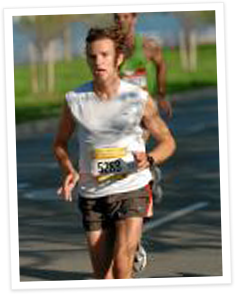
The Runner:
- Name: Tim Parker
- Age: 46
- Hometown: Baltimore, MD
Previous PR's
10 mile-58:50
Half Marathon - 1:21:40
Tim's Problems:
- Worried that age was the cause of his lack of progression in personal best times over the last few years.
- Running too hard on his easy days, which was causing him to be fatigued going into his important workout sessions and not being able to hit his times.
- Not doing the right type of running to specifically address the demands of his target race distances of 10 mile to the half marathon. For example, too much VO2Max workouts at the expense of developing aerobic strength.
- Frequent injuries, which derailed training at inopportune times.
How RunnersConnect Helped Him:
- First, we took a look at Tim's race performances across the board, from 5k to the half marathon. This helped us identify the weak areas in his current fitness and assign workouts that appropriately addressed these weaknesses.
- Tim's coach assigned him specific paces for all of his runs to ensure that he ran his easy days easy enough to recover for the next workout session.
- Tim kept in touch with his coach to ensure that his body was responding to the training as intended.
- We worked on developing Tim's aerobic strength so he could better handle the specific demands of the 10 mile to half marathon race distance.
Tim's Results:
- After only three months of working together, Tim dropped his half marathon PR by more than a minute and thirty seconds to 1:20:13 at the very hill Baltimore Half Marathon. In 2010, Tim PR'd again to break 1:20 for the first time ever, posting a 1:19:40 finish at the Richmond Half marathon.
- Tim took more than 30 seconds off his course PR at the Baltimore Club Challenge in February. This was the first race of the spring and a great sign of things to come.
- Tim hasn't missed a step of running due to injury since August of 2009, despite running some of the best workouts of his life.
-
Jim Cherry - A 16 Minute PR at 10k
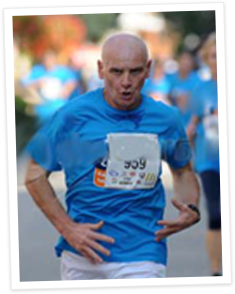
The Runner:
- Name: Jim Cherry
- Age: 50
- Hometown: Science Hill, KY
Previous PR's
10k - 1:13:00
Half Marathon - 2:18:00
Jim's Problems:
- Jim had a very unstructured training program that relied on runs that were either too easy or in the "gray" zone of training - too slow to gain benefits, but too fast to truly be a recovery run.
- Although he had been running for about 4 years, Jim was fairly new to racing. His limited race experience was causing inconsistent race results and a he had a lot of questions about proper warm-up and race strategy.
- Because Jim had never really trained before, he didn't know how to properly run workouts or effectively pace himself during speed workouts or tempo runs.
How RunnersConnect Helped Him:
- First, we identified the areas of weakness in Jim's fitness by analyzing his past race results and current training paces.
- Because Jim had never done speed work before, and he is an older runner, we needed to introduce speed work very gradually into his training plan. First, we started with short strides after his easy runs and then slowly introduced short bursts of speed into his long runs and tempo run days. This enabled us to slowly build up his tolerance for faster and more difficult training.
- To help Jim adapt to the race demands and environment he would encounter, I assigned him very specific paces on his tempo workouts on the track. This enabled him to develop a "feel" for how hard he should be running. Eventually, we moved the workouts to the hilly terrain of his normal running routes and developed his sense of pace on the roads.
- Through consistent communication with his coach, we monitored how Jim's body was responding and adapting to the workouts and the new workload.
Jim's Results:
- After less than a year working together, Jim's new PR's are:
10k - 56:56 (A 16- minute improvement!)
Half Marathon - 2:02:11
Runners with Hectic Schedules
-
Dan Frengel - Working Around an Unorthodox Schedule For a 10-minute HM PR
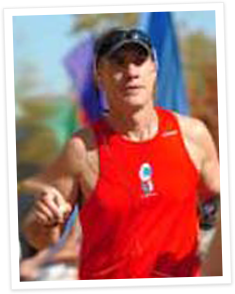
The Runner:
- Name: Dan Frengel
- Age: 44
- Hometown: Baltimore, MD
Previous PR's
Half Marathon - 1:52
10-miler - 1:26:40
Marathon: 3:55:13
Dan's Problems:
- Dan has an unconventional work schedule that requires an interesting mix of hard days and easy days that aren't often addressed in normal training programs. For example, he works all day Tuesday and into Wednesday, which negates any possible workouts on those two days. Dan was the perfect example of someone who can benefit from our custom training program, at a very affordable price.
- Dan was having success at some of the shorter distances, but could not translate that to the longer ten-mile and half marathon distances.
- Dan had difficulty pacing himself during races, which was causing him to fade during the later half of his races.
How RunnersConnect Helped Him:
- First, we created a very customized schedule for Dan that not only allowed him to get in the necessary workouts that would allow him to race faster, but also maximized his recovery time during his unorthodox work schedule. Furthermore, during the first few months, we used constant feedback to ensure that his body was responding as intended.
- We worked extensively on developing a sense of pace. It is not an easy or quick process, but through the use of track workouts and specialized cutdown workouts, Dan was able to grasp the "feel" of pacing. Furthermore, we provided detailed race plans for Dan that mapped out a target pace for each mile, which helped him transfer his new sense of pace to a stronger finish on race day.
- Finally, we totally reworked the type of workouts Dan completed. First, we identified his weaknesses and spent two months working exclusively on developing physiologic areas that needed improvement. Then, we moved the training to a half marathon focus, with specifically targeted workouts.
Dan's Results:
- After only two months working together, Dan recorded personal bests at the 10-mile and half marathon distance. His most recent half marathon race was a 10-minute improvement. Not only did he break the 1:50 barrier for the first time, but her nearly skipped the 1:40's all together.
- Later in the Fall, Dan crushed his Marathon PR by almost 30 minutes, running 3:25 at the Marine Corps marathon.
Half Marathon PR - 1:41:06
10-mile PR - 1:20:19
-
Hannah Jennings - Teacher Works Around Busy Schedule to Crush All of Her PRs
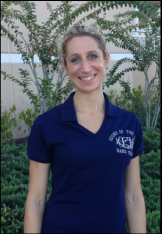
The Runner:
- Name: Hannah Jennings
- Age:
- Hometown: Orlando, FL
Previous PR's
Marathon: 3:33
Half Marathon - 1:36
"I feel like I have hit a plateau and am looking to break through that and take my running o the next level. I feel like I have some faster race times in me, but am not sure how to ap into them. I'm really looking to improve and see what I can do. I would love to have a 3:20 ish marathon time, and qualify for New York with a 135 or better half marathon time"
Hannah's Problems:
- Balancing wanting to get better with work and life
- Injuries
- Same type of workouts
- Adjusting for the heat
Hannah is a teacher and band coordinator and therefore has a busy schedule, both during and after school as well as on weekends. She needed a schedule that helped balance her work obligations with her desire to reach the next level, which required increasing her mileage and workout intensities.
Hannah had been dealing with a bad bout of patella tendonitis. like most runners, she was treating the symptoms and not the cause of the problem, which resulted in it becoming a recurring injury.
Hannah was working with a training program run from the local store. The workouts were w�structured but she's been following the same plan for a few years so the workouts were becoming stagnant and not challenging other energy systems.
Hannah lives in Orlando and training in the summer can become a major issue. Hannah wasn't adjusting her workout times to account for the heat and was losing confidence when workouts didn't go well. This created a snowball effect and translated to overtraining and a lack of self-belief.
How RunnersConnect Helped Her:
- Firstly, we were able to create a completely custom schedule for Hannah that allowed her to take off the days she needed and do her hardest, longest workouts on the days that made the most sense for her schedule. As a result, she was less stressed about squeezing in workouts and able to recover better since she was able to utilize her rest days properly.
- We added injury prevention and strength work to Hannah's schedule so she could fix the lack of hip strength that was causing her knee pain. We virtually healed the injury and she hasn't felt in almost 2 years.
- We added variety to Hannah's schedule that helped change the stimulus and spark new gains. We targeted each "type" of threshold - aerobic threshold, lactate threshold, and anaerobic threshold using a variety of workouts that not only added a new challenge but strengthened specific physiological systems more distinctly.
- Finally, our training system automatically adjusted Hannah's times for the temperatures she was facing. This allowed her to be more consistent, stay in the right effort zones, and adapt her training to the hot Florida summers.
Hannah's Results:
- Marathon - 3:15 and first overall female
- Half Marathon - 1:28
-
Laurette Balinsky - Busy Lawyer Adapts Training to Break 19 Minutes for 5k
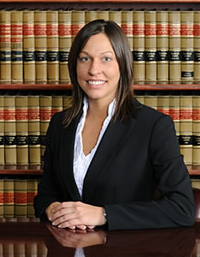
The Runner:
- Name: Laurette Balinsky
- Age:
- Hometown: Unknown
Previous PR's
5k - 21:17
Half Marathon: 1:46:00
Marathon: 3:47
Laurette's Problems:
- Laurette was dealing with injuries on her right side (knee, ankle tendonitis, hip, knee, plantar). Most of the injuries were brought on either by running on the track and trying to go too fast or trying to increase her mileage.
- These injuries were typically confining Laurette to 1 harder workout and one long run per week, which was making it difficult to have consistent improvement - both because she initially lacked the intensity to create a new stimulus and because the new stimulus created injury.
- Laurette struggled at times to balance her busy professional work life with her goals in running. As her mileage increased, she noticed getting more stressed, less recovery, and struggled in training. She needed to find that optimal balance each week to run to her potential but still work demanding hours and needed rest/down weeks to allow for proper recovery.
How RunnersConnect Helped Her:
- The first step with Laurette was increasing her weekly mileage slowly. We were able to accomplish this by balancing the mileage around her harder workout days. We also reduced the long run temporarily, which allowed her to space out her mileage more.
- After a month working on increasing mileage, we added in a second harder session. The key difference here is that we kept a tight rein on Laurette's paces (by assigning her ranges within a 5-10 second window) which kept her from pushing the pace beyond her muscular capabilities. Over the course of weeks and months the training paces slowly increased as Laurette's body adapted to the workload.
- Laurette was able to set her own schedule (she chose which days to run/workout/long) based on what worked best for her. As her mileage grew, we capped her progress at a volume that made sense for her progression and available time to train. Also, we included a down week in Laurette's training every 4-5 weeks to ensure she had enough recovery and chance to mentally recharge during long training segments.
Laurette's Results:
- 5k - 18:50
- Half Marathon: 1:32:22
- Marathon: 3:24:39
